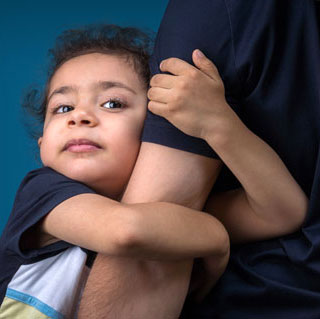A child who cries and clings when a parent leaves may be showing separation anxiety. A child with special needs may also show distress by regressing or becoming hyperactive. A little separation anxiety can be a positive sign. It shows that a child recognizes and has formed attachments with loved ones. But separation anxiety can make leaving her with child care providers or others stressful for everyone. Here are some things to remember about separation anxiety.
When might a child show separation anxiety?
- Fear of less familiar people and places often begins when a child is about 8 months old. It can begin as early as 5 months of age. It usually peaks between 10 and 18 months and fades by the age of 2 years.
- Both attachment and the ability to separate easily may develop at an older age in a child with developmental delays or special needs.
- Anxiety may become greater for any child when there are changes in the environment, such as the birth of a new baby.
- A parent’s stress level can contribute to separation anxiety. Parents who feel secure about their child care arrangements will find it easier to leave. They are confident that the care provider understands and can work with their child’s special needs. Remember, some time spent apart can be good for both children and parents.
How can parents help make partings easier for a child?
- Stay with him until he becomes familiar with a new place or person.
- Follow a structured goodbye ritual. Children with special needs often find structure reassuring.
- Avoid sneaking away or teasing or scolding a child for being upset.
- Reassure the child that Mommy or Daddy will be back after naptime or at dinnertime, even if he can’t tell time. Be sure to keep that promise.
- Let him have his favorite blanket or other “lovey” for comfort. Some children like to keep a family photo or a familiar possession from home.
- Avoid leaving a child when he is hungry, tired, or sick.
Is it more than separation anxiety?
- Consider other possible sources of stress in a child’s life.
- Think about changing child care for a child who remains inconsolable in a new child care setting for more than two weeks.
- Seek help for a child who stops eating or sleeping well, refuses to interact with others, or has an ongoing change in behavior.

